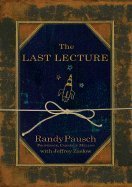What do you think?
Rate this book


A lot of professors give talks titled "The Last Lecture." Professors are asked to consider their demise and to ruminate on what matters most to them. And while they speak, audiences can't help but mull the same question: What wisdom would we impart to the world if we knew it was our last chance? If we had to vanish tomorrow, what would we want as our legacy?
When Randy Pausch, a computer science professor at Carnegie Mellon, was asked to give such a lecture, he didn't have to imagine it as his last, since he had recently been diagnosed with terminal cancer. But the lecture he gave--"Really Achieving Your Childhood Dreams"--wasn't about dying. It was about the importance of overcoming obstacles, of enabling the dreams of others, of seizing every moment (because "time is all you have...and you may find one day that you have less than you think"). It was a summation of everything Randy had come to believe. It was about living.
In this book, Randy Pausch has combined the humor, inspiration and intelligence that made his lecture such a phenomenon and given it an indelible form. It is a book that will be shared for generations to come.
209 pages, Hardcover
First published April 8, 2008

(1) Live simple life - don't buy things to impress othersIf there is one lesson that I consider the best advice I got from Randy Pausch, this should be it: (12) If I could give three words of advice, they would be "tell the truth." If I got three more words, I'd add: "All the time."
(2) Never make a decision until you have to.
(3) Even if in a position of strength, whether at work or in relationships, you have to play fair. Just because you're in a driver's seat, doesn't mean you have to run people over.
(4) Parents should make their love known to their children. They don't need to be alive to do this.
(5) If your car has a dent, you don't have to have it removed. It could be a statement of who you are. Not everything needs to be fixed.
(6) Don't finish someone's sentences. And talking louder or faster doesn't make your idea any better.
(7) If you wait long enough, people will surprise and impress you.
(8) Not what they do, not what they say.
(9) Whether you think you can or can't, you're right.
(10) A lot of people want a shortcut. I find the best shortcut is the long way, which is basically two words: work hard.
(11) Proper apologies have three parts:A) What I did was wrong
B) I feel badly that I hurt you
C) How do I make this better?